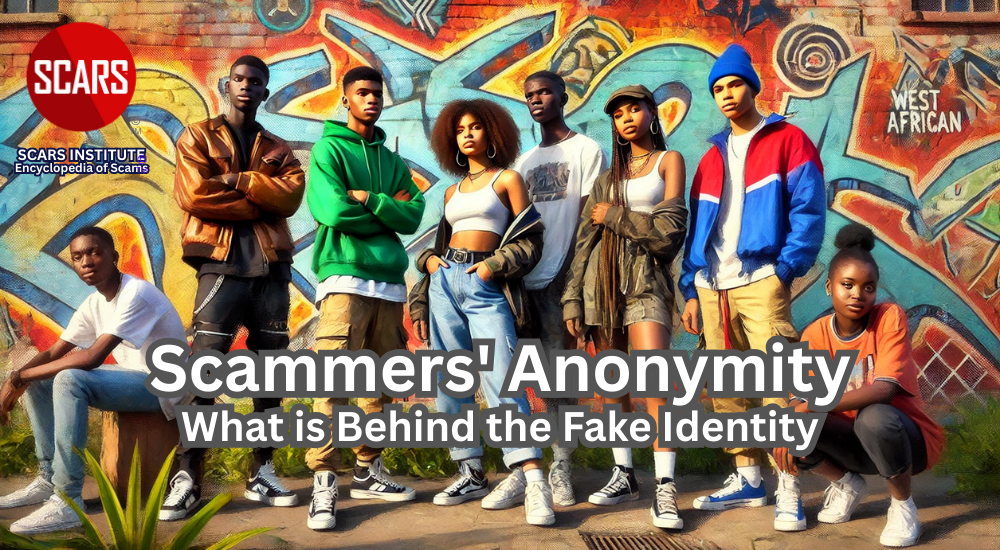
SCARS Institute’s Encyclopedia of Scams™ Published Continuously for 25 Years

RSN™ Guide: 15 BASIC Warning Signs Of Romance Scamming
Back To The Basics Since New Victims Come Along Every Day!
THE FOLLOWING WAS ORIGINALLY PUBLISHED IN 2011 – BUT THEIR TACTICS REMAIN THE SAME
Here are the Warning Signs to look out for with Romance Scams:
- APPARENT AGE: Scammers use stolen photos from modeling sites and magazines, and military soldiers. Look at the apparent age of the person in the photo compared to the age in their profile.
- ASK FOR EMAIL OR TO COMMUNICATE PRIVATELY: Scammers often ask right away for your email address or they give you theirs right away. They want to communicate off the website as soon as possible. By itself, not always the sign of a scammer, but taken with other indicators can be.
- ALWAYS DOWN ON THEIR LUCK: Scammers tend to make hard-, “feel-sorry-for” stories and ask for help or money, or even get you to offer them money or help.
- THEY HAVE MILLIONS FOR JUST YOU: Scammers will offer you money. They will do this in order to gain your trust and send counterfeit checks, and this will get you in trouble with the banks.
- ARE EX-PATRIOTS: Scammers may say they are from your country but have lost their ID’s, have been arrested or injured while working in a foreign country. Then they will ask you to lend them money to get back home. They may be trapped in a hotel, or have to bride an official, the list goes on and on.
- AFRICA IS POISON: Scammers are mostly from Africa, especially Nigeria. There are large companies, where people get paid for sitting and sending SCAM MESSAGES all day to hard-working, innocent people. This is a huge business in Africa!
- WOMEN ARE TOO PRETTY: There are many members, who enter large numbers of fake profile photos of super-models, and women, who are drop-dead gorgeous. They use these profiles to lure men into falling in love and sending thousands of dollars to help them with medical, personal, or family problems, or even to pay for travel and visa fees to visit them. The photos are fake, and the girls are not real, well, even though they are real, they are not who you think they are, and you will never meet them.
- SCAMMER GRAMMAR: Scammers often write or speak very broken English (what we call “Scammer Grammar”) and use automated translators, making their profiles and language usage strange. Some examples:
“ I rather nice girl. Have me to brown eyes, light hair. my size is 165 centimeters…. I like having wallpaper good for me of house. Of course I am work seriously. I like options. I sometimes be impatient, gender and happy. I see your technique at this site like and find it good” “i am god fearing man and like to find a woman that makes me really go crazy. and I want her to be with me asap” - IMPROPER LANGUAGE: Scammers often don’t speak English at all and may not even know what to say. Sometimes they put the text they use to mass e-mail people as their profile description:
“My name is John Williams, am 50 years, single and am from England. I saw your profile here and loved to be friends for a very long time and get to know you. I am operator and also father with a grown son. am searching for a real relationship and i cant resist getting to know you more and better. i want to meet you in person and talk more, we can talk more on yahoo ID. If you have, add me ……so we talk and get to know eachother more….i wait for you reply offline. my son say “daddy, you need someone after being alone all these years”…please talk to me, I wait for your reply. Love, John”. - COPIED PROFILES / STOLEN IDENTITIES: Scammers may also copy some other users’ profiles, so they sound more realistic. They also use fake photos of models, or the photos of the people who sent them photos in the past. If you suspect a scammer, just ask for a photo that day from their smartphone. Ask for something specific, like the front of their house or their car.
- OVER COMPLEMENTARY: Scammers often write very flattering emails full of flirts and compliments to members completely out of their age range, especially to those, who stated that they are widows or really lonely. By itself, this is not a true indicator, but again, taken with other clues is another red flag.
- TOO MUCH INFORMATION TOO FAST: Scammers try to build up trust upfront by giving you a lot of their personal information to make you comfortable in sharing yours. They also make up false first and last names in their profiles.
Common names are like “John Williams”, “Greg Smith”, and so on. If it sounds like a fake name, chances are it probably is! Another example of a scam email is someone from Nigeria writing: “Hello dear. I am Kenneth Cole from sunny Phoenix, Arizona. I am actually from Singapore. I am graduate from Anglia Technical University in Essex UK and also a diploma holder from Arizona State College in graphic designing. I am handsome, Nice, Funny, and like Swimming, Sports, and Traveling.” Always, do a Google Search for EVERYONE you meet, just to see if they look like a real person. - LEAVE FACEBOOK OR A DATING SITE QUICKLY: Scammers want you to get off the website to communicate offline as soon as possible. The reason may be that they cannot accept responses through the dating site, or are afraid that their messages may be monitored. Actually, this can be a good thing for you, because if you get an email from them, you can check the “Sent From” or “Received From” IP address in the properties to locate them.
- LOVE NOTES & POEMS: Scammers may send you very poetic emails, beautiful words, and very flattering compliments. They may also be seductive, use pet names, and frequently use “dear”. Their emails often sound general, so that they can mass email them to many people.
- REDIRECTING: Scammers may invite you to another website, or even to a porn or webcam website. Think about it, why would they be on one site and ask to go to another? These sites are set up to gather your personal info, such as credit card information and email address, and can also harm your computer by sending viruses and spyware.
So in summary, one of these alone is not a danger sign. Three or more RUN LIKE HELL!
RSN Team
a division of SCARS
Miami Florida U.S.A.
– – –
WESTERN UNION REPAYMENT PROGRAM NEWS
FOR THE LATEST INFORMATION ABOUT THE WESTERN UNION REPAYMENT / REMISSION PROGRAM CLICK HERE – IT IS STILL OPEN FOR A PETITIONS FOR REPAYMENT
– – –
Tell us about your experiences with Romance Scammers in our Scams Discussion Forum on Facebook »
FAQ: How Do You Properly Report Scammers?
It is essential that law enforcement knows about scams & scammers, even though there is nothing (in most cases) that they can do.
Always report scams involving money lost or where you received money to:
- Local Police – ask them to take an “informational” police report – say you need it for your insurance
- Your National Police or FBI (www.IC3.gov)
- The Scars Worldwide Reporting Network HERE or on www.Anyscam.com
This helps your government understand the problem, and allows law enforcement to add scammers on watch lists worldwide.
Visit our NEW Main SCARS™ News & Information Facebook page for much more information about scams and online crime: www.facebook.com/SCARS.News.And.Information
To learn more about SCARS visit www.AgainstScams.org
Please be sure to report all scammers HERE or on www.Anyscam.com
All original content is Copyright © 1991 – 2018 SCARS All Rights Reserved Worldwide & Webwide – RSN/Romance Scams Now & SCARS/Society of Citizens Against Romance Scams are all trademarks of Society of Citizens Against Romance Scams Inc.
#ReportingScammers #WhereToReportScams #Anyscam #SCARS #RSN #CatchScammers #ScammerWatchLists #ArrestScammers #REPORTSCAMMERS #ANYSCAM #AVOIDSCAMS #ROMANCESCAMS #ACTAGAINSTSCAMS #NIGERIANSCAMMERS #ROMANCESCAMSNOW #SCARS #GHANASCAMMERS #FAKEPROFILES #FACEBOOKSCAMMERS #BOYCOTTAFRICANCOFFEE
-/ 30 /-
What do you think about this?
Please share your thoughts in a comment below!
Table of Contents
LEAVE A COMMENT?
Thank you for your comment. You may receive an email to follow up. We never share your data with marketers.
Recent Comments
On Other Articles
- on Finally Tax Relief for American Scam Victims is on the Horizon – 2026: “I just did my taxes for 2025 my tax account said so far for romances scam we cd not take…” Feb 25, 19:50
- on Reporting Scams & Interacting With The Police – A Scam Victim’s Checklist [VIDEO]: “Yes, this is a scam. For your own sanity, just block them completely.” Feb 25, 15:37
- on Danielle Delaunay/Danielle Genevieve – Stolen Identity/Stolen Photos – Impersonation Victim UPDATED 2024: “She goes by the name of Sanrda John now” Feb 25, 10:26
- on Reporting Scams & Interacting With The Police – A Scam Victim’s Checklist [VIDEO]: “So far I have not been scam out of any money because I was aware not to give the money…” Feb 25, 07:46
- on Love Bombing And How Romance Scam Victims Are Forced To Feel: “I was love bombed to the point that I would do just about anything for the scammer(s). I was told…” Feb 11, 14:24
- on Dani Daniels (Kira Lee Orsag): Another Scammer’s Favorite: “You provide a valuable service! I wish more people knew about it!” Feb 10, 15:05
- on Danielle Delaunay/Danielle Genevieve – Stolen Identity/Stolen Photos – Impersonation Victim UPDATED 2024: “We highly recommend that you simply turn away form the scam and scammers, and focus on the development of a…” Feb 4, 19:47
- on The Art Of Deception: The Fundamental Principals Of Successful Deceptions – 2024: “I experienced many of the deceptive tactics that romance scammers use. I was told various stories of hardship and why…” Feb 4, 15:27
- on Danielle Delaunay/Danielle Genevieve – Stolen Identity/Stolen Photos – Impersonation Victim UPDATED 2024: “Yes, I’m in that exact situation also. “Danielle” has seriously scammed me for 3 years now. “She” (he) doesn’t know…” Feb 4, 14:58
- on An Essay on Justice and Money Recovery – 2026: “you are so right I accidentally clicked on online justice I signed an agreement for 12k upfront but cd only…” Feb 3, 08:16
ARTICLE META
Important Information for New Scam Victims
- Please visit www.ScamVictimsSupport.org – a SCARS Website for New Scam Victims & Sextortion Victims
- Enroll in FREE SCARS Scam Survivor’s School now at www.SCARSeducation.org
- Please visit www.ScamPsychology.org – to more fully understand the psychological concepts involved in scams and scam victim recovery
If you are looking for local trauma counselors please visit counseling.AgainstScams.org or join SCARS for our counseling/therapy benefit: membership.AgainstScams.org
If you need to speak with someone now, you can dial 988 or find phone numbers for crisis hotlines all around the world here: www.opencounseling.com/suicide-hotlines
A Note About Labeling!
We often use the term ‘scam victim’ in our articles, but this is a convenience to help those searching for information in search engines like Google. It is just a convenience and has no deeper meaning. If you have come through such an experience, YOU are a Survivor! It was not your fault. You are not alone! Axios!
A Question of Trust
At the SCARS Institute, we invite you to do your own research on the topics we speak about and publish, Our team investigates the subject being discussed, especially when it comes to understanding the scam victims-survivors experience. You can do Google searches but in many cases, you will have to wade through scientific papers and studies. However, remember that biases and perspectives matter and influence the outcome. Regardless, we encourage you to explore these topics as thoroughly as you can for your own awareness.
Statement About Victim Blaming
SCARS Institute articles examine different aspects of the scam victim experience, as well as those who may have been secondary victims. This work focuses on understanding victimization through the science of victimology, including common psychological and behavioral responses. The purpose is to help victims and survivors understand why these crimes occurred, reduce shame and self-blame, strengthen recovery programs and victim opportunities, and lower the risk of future victimization.
At times, these discussions may sound uncomfortable, overwhelming, or may be mistaken for blame. They are not. Scam victims are never blamed. Our goal is to explain the mechanisms of deception and the human responses that scammers exploit, and the processes that occur after the scam ends, so victims can better understand what happened to them and why it felt convincing at the time, and what the path looks like going forward.
Articles that address the psychology, neurology, physiology, and other characteristics of scams and the victim experience recognize that all people share cognitive and emotional traits that can be manipulated under the right conditions. These characteristics are not flaws. They are normal human functions that criminals deliberately exploit. Victims typically have little awareness of these mechanisms while a scam is unfolding and a very limited ability to control them. Awareness often comes only after the harm has occurred.
By explaining these processes, these articles help victims make sense of their experiences, understand common post-scam reactions, and identify ways to protect themselves moving forward. This knowledge supports recovery by replacing confusion and self-blame with clarity, context, and self-compassion.
Additional educational material on these topics is available at ScamPsychology.org – ScamsNOW.com and other SCARS Institute websites.
Psychology Disclaimer:
All articles about psychology and the human brain on this website are for information & education only
The information provided in this article is intended for educational and self-help purposes only and should not be construed as a substitute for professional therapy or counseling.
While any self-help techniques outlined herein may be beneficial for scam victims seeking to recover from their experience and move towards recovery, it is important to consult with a qualified mental health professional before initiating any course of action. Each individual’s experience and needs are unique, and what works for one person may not be suitable for another.
Additionally, any approach may not be appropriate for individuals with certain pre-existing mental health conditions or trauma histories. It is advisable to seek guidance from a licensed therapist or counselor who can provide personalized support, guidance, and treatment tailored to your specific needs.
If you are experiencing significant distress or emotional difficulties related to a scam or other traumatic event, please consult your doctor or mental health provider for appropriate care and support.
Also read our SCARS Institute Statement about Professional Care for Scam Victims – click here to go to our ScamsNOW.com website.


















Superb concerns totally, you only received a brand new readers. What would anyone propose relating to your article that you just built at times in the past? Any positive?